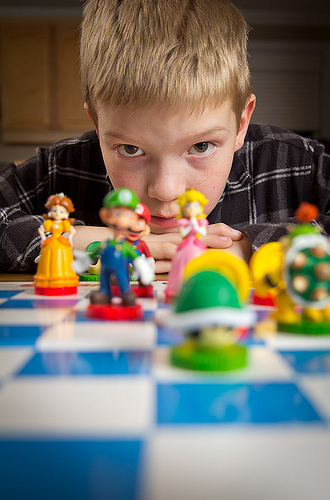The theories and practicalities of Praxis
Aristotle believed there was two types of intelligence. One is translated as “theoretical wisdom”, which refers to book smarts, and the other is “practical wisdom”, which refers to the ability to apply theoretical wisdom into action. Aristotle gives an example of a student learning geometry: this student will come out of school with theoretical wisdom, but must also learn to apply it into the real world. An example would be to carry out a work of architecture with the geometry he learned in school. We need both of these intelligences to be functional; Praxis gives you this.
Praxis is not originally a game concept, but I believe it can significantly amplify game based learning. This is the process intuitively adopted by gamers to master a lot of popular complex games. I mentioned in one of my previous articles how reading is a key part for teenagers playing World of Warcraft, they have to read about the theory and learn how to apply that knowledge in the game. This is Praxis, and by playing these games they’re learning how to learn.

I intuitively learned the Praxis method by playing chess in my early teens, I had to read books on chess theory and apply it to the game. Entering college I started playing another game: Business simulation competitions. I participated and won in national competitions carried out by the organizations of PBL and DECA. I participated in the entrepreneurship events, which are a lot like the American TV show Shark Tank. The student pretends to be an entrepreneur asking for a loan to start a business. In order to win these events you must learn real business theory, but you also need the practical intelligence to organize and deliver the content.
A lot of these competitions are technically a game. What’s really great about them is that unlike chess or WoW, the theory and skills you learn are directly applicable into the real world. You need to read real business books, write a sound business plan and clearly present your ideas orally. What these events are doing is technically Praxis. There’s a lot of differences between the real world and performing in these competitions, but participating in them myself I can tell you that these competitions were far better at preparing me outside school than all my business classes combined.

CC Image by GVAHIM
Dave Snowden who is a leader in Knowledge Management theory is a really big advocate of Praxis. He explains that Praxis is how the brain is intended to learn, this used to be called the apprenticeship method. You’re learning theory while you’re doing a task. Praxis will literally rewire your brain in a period of minimum 2-3 years in order to function around a complex task. An example Dave gives is a study done on London taxi drivers. So he explains that in order to exceed at a complex task you need to know the why (theoretical wisdom) and the how (practical wisdom).
What I found fascinating was that Snowden’s description on how to acquire complex skills in the real world are nearly identical to the process gamers go through in complex games like chess and WoW. These games weren’t originally designed with giant manuals (that’s bad game design!) and yet players still managed to create and consume massive amounts of theoretical content apart from play time. This process emerged as the most effective way to improve in the game. These games are imitating reality since there’s a lot of empirical evidence that shows this process is how you should gain skills in order to master your career. Snowden has an interesting metaphor intended to make connections mainly on running a business and software design, which I believe apply to gamification:
Imagine you hire two individuals to cook you a meal. One is what Dave calls a “recipe book user,” These are the individuals that will take out their manual, look at what’s worked with other people and try to apply it. They’ll re-engineer your kitchen to match the environment they were trained on and if nothing goes wrong (which usually does) they’ll cook a decent meal.
On the other hand you have a master chef. This individual has gone through an apprenticeship for many years, which means he’s been learning the theory while applying it. He’ll make you a wonderful meal with whatever you have laying around and if something goes around he’ll adapt because he understands the why and the how.
Gabe Zichermann does this when explaining gamification (which is one of the reasons I was originally attracted to his work), he explains you why gamification works through the dopamine releases and the science behind that and then gives you practical applications with the case studies. This is why I’ve been writing mostly on the science of gamification to help you adapt on the projects you’re working on. You need to know why the process works in order to adapt to your particular context.
Stay tuned for my follow-up post on Praxis as I dive into the Theoretical aspect more.
Cover Image by Gary Simmons







interesting
Nice article!
I am going to read more about this subject.